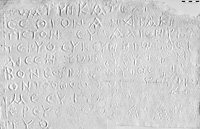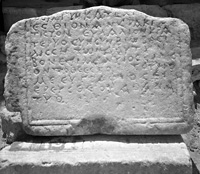 MAMA XI 211 (Axylon)
MAMA XI 211 (Axylon) 
Funerary inscription in verse for Eulalios and Basilissa
- Type of monument:
- Funerary inscription in verse.
- Location:
- Azak (Hodoğlu) (Axylon): not recorded.
- Description:
- White marble slab with plain mouldings; inscription in panel. Broken above.
- Dimensions:
- Ht. 0.52+; W. 0.73; Th. 0.20; letters 0.015-0.040.
- Record:
- Squeeze; WMC notebook copy; photograph (1954/75).
- Publication:
- W. M. Calder, MAMA VII xxiii (text only); (Merkelbach and Stauber 2001: 14/02/13).
- Date:
- Fourth or fifth century AD.
. . Α̣ γ̣ύη κατέχι . . .
ΕΣΘΙΟΝ ἄνδρα κρά-
τιστον, Εὐλάλιον Κρα-
τέρ⟨ου⟩ σὺν συνβίῳ Βασι-
5λίσσῃ· τῶν δ᾿ αὖ τύν-
βον ἔδιμεν υἱὸς φ̣ίλ[ο]ς
ὃν ποθέεσκον, τοὔνο-
με Εὐγράφιος, εἱ-
ερεὺς θεοῦ ἀθανά-
10του.
Lines 1-2: [. . . πολυ]|εσθιον Calder; [εὐ]|έσθιον (i.e. εὐέστιον) or [πολύ]|εσθ⟨λ⟩ον Merkelbach and Stauber.
Line 6: υἱὸς ⟨φίλος⟩ Calder.
...earth holds... an excellent man, Eulalios son of Krateros, with his wife Basilissa. Their tomb was constructed by their dear son, whom they loved; his name is Eugraphios, priest of the immortal god.





In lines 1-2, Merkelbach and Stauber plausibly suggest reading [πολύ]|εσθ⟨λ⟩ον, ‘entirely good’, as in SEG 1, 453 (Kadınhanı). The names Eulalios and Eugraphios seem to be exclusively Christian: for Eulalios, cf. RECAM II 323 (Sinanlı) and MAMA VII 36 (Kurşunlu); for Eugraphios, cf. MAMA I 173 (Sarayönü: an Apotactite presbyter) and Laminger-Pascher 1992: 48, no. 47 (Losta). For the name Basilissa in this region, see also MAMA XI 361 (1954/41: Kana); MAMA XI 287 (1956/130: Zengicek [Koçyaka]). The Christian god is often designated with the phrase ἀθάνατος θεός (lines 9-10) in this region: see e.g. MAMA VII 587 (Kolukısa); MAMA I 229-30, 267 (Kadınhanı); Ramsay, Phrygia II 520, no. 361 (Eumeneia); SEG 15, 796 (Kotiaion).
The verb ἔδιμεν (i.e. ἔδειμεν) is found in a similar context in two further funerary inscriptions in verse from the Axylon: SEG 6, 291 (Merkelbach and Stauber 2001: 14/04/02, Gözlü) and MAMA VII 558 (Kuyulusebil). For the phrase ὃν ποθέεσκον in line 7, compare MAMA VII 583 (Merkelbach and Stauber 2001: 14/03/03, Zengen), τὴν πολλὰ ποθέεσκεν φίλη μήτηρ.